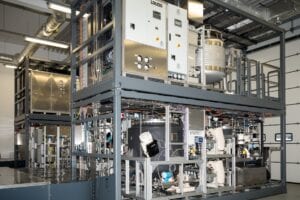Lanxess AG (Cologne, Germany) has joined forces with Hüni AG, which is based in Switzerland, to jointly work on initial customer projects related to the commercialization of Lanxess’ modular plant concept ReeL (resource-efficient manufacture of leather chemicals). In this partnership, Lanxess and Hüni will elaborate the individual concepts for initial customers, with Hüni focusing primarily on plant engineering and construction of the modules, while anxesswill contribute its chemical process engineering and application expertise to the X-Biomer production.

This plant allows tanneries to recycle shavings from leather production directly on-site and use these to produce X-Biomer retanning agents automatically. Photo: LANXESS AG
The innovative ReeL technology was developed by the anxess Leather business unit in partnership with the German companies Invite and Heller-Leder. It is used for recycling shavings from leather production in the tannery directly on-site and using these to produce X-Biomer retanning agents fully automatically. This approach completely eliminates any of the costs involved in transporting the materials to recycling companies or for disposal.
Since November 2017, and as part of the ReeL project, which is sponsored by the German Federal Ministry of Education and Research (BMBF), anxess has been running a pilot plant for in-situ production of the retanning agent X-Biomer at and together with the Heller-Leder tannery in Hehlen in Lower Saxony, Germany. The process has been tested under real-life production conditions and developed to market readiness. Six different X-Biomer product types have already been developed. A range of other exciting applications are in the research pipeline.
Dr. Dietrich Tegtmeyer, head of the ReeL project at LANXESS: “These plants dramatically improve the sustainability profile. On the one hand, in-situ and just-in-time production helps to save a great amount of logistics and packaging resources; on the other hand, we no longer have to dispose of shavings as waste products because we can now use them as a raw material for the required retanning chemicals.”